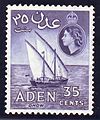
Back بوابة:اليمن Arabic Portail:Yémen French Portal:Yaman Malay Portal:Iémen Portuguese Портал:Йемен Russian Портал:Ємен Ukrainian
Yemen Portal


Yemen, officially the Republic of Yemen, is a country in West Asia. Located in southern Arabia, it borders Saudi Arabia to the north, Oman to the northeast, the Red Sea to the west, and the Indian Ocean to the south, sharing maritime borders with Eritrea, Djibouti and Somalia across the Horn of Africa. Covering roughly 528,000 square kilometres (203,861 square miles), with a coastline of approximately 2,000 kilometres (1,200 miles), Yemen is the second largest country on the Arabian Peninsula. Sanaa is its constitutional capital and largest city. Yemen's estimated population is 34.7 million, mostly Arab Muslims. It is a member of the Arab League, the United Nations, the Non-Aligned Movement and the Organisation of Islamic Cooperation.
Owing to its geographic location, Yemen has been at the crossroads of many civilisations for over 7,000 years. In 1200 BCE, the Sabaeans formed a thriving commercial kingdom that included parts of modern Ethiopia and Eritrea. In 275 CE, it was succeeded by the Himyarite Kingdom, which spanned much of Yemen's present-day territory and was heavily influenced by Judaism. Christianity arrived in the fourth century, followed by the rapid spread of Islam in the seventh century. Yemenite troops played a crucial role in early Islamic conquests. Various dynasties emerged between the 9th and 16th centuries. During the 19th century, the country was divided between the Ottoman and British empires. After World War I, the Kingdom of Yemen was established, which in 1962 became the Yemen Arab Republic (North Yemen) following a coup. In 1967, the British Aden Protectorate became the independent People's Democratic Republic of Yemen (South Yemen), the first and only officially socialist state in the Arab world. In 1990, the two Yemeni states united to form the modern Republic of Yemen, with Ali Abdullah Saleh serving as the first president until his resignation in 2012 in the wake of the Arab Spring.
Since 2011, Yemen has been enduring a political crisis, marked by street protests against poverty, unemployment, corruption, and President Saleh's plan to amend Yemen's constitution and eliminate the presidential term limit. By 2015, the country became engulfed by an ongoing civil war with multiple entities vying for governance, including the Presidential Leadership Council of the internationally recognized government, and the Houthi movement's Supreme Political Council. This conflict, which has escalated to involve various foreign powers, has led to a severe humanitarian crisis. (Full article...)
Selected article -
The North Yemen civil war, also known as the 26 September Revolution, was a civil war fought in North Yemen from 1962 to 1970 between partisans of the Mutawakkilite Kingdom and supporters of the Yemen Arab Republic. The war began with a coup d'état carried out in 1962 by revolutionary republicans led by the army under the command of Abdullah as-Sallal. He dethroned the newly crowned King and Imam Muhammad al-Badr and declared Yemen a republic under his presidency. His government abolished slavery in Yemen. The Imam escaped to the Saudi Arabian border where he rallied popular support from northern Zaydi tribes to retake power, and the conflict rapidly escalated to a full-scale civil war.
On the royalist side, Jordan, Saudi Arabia, and Israel supplied military aid, and Britain offered covert support. The republicans were supported by Egypt (then formally known as the United Arab Republic or UAR) and were supplied warplanes from the Soviet Union. (Full article...)
List of selected articles
|
|---|
Selected biography -
Yahya Muhammad Hamid ed-Din (or Imam Yahya) (Arabic: يحيى محمد حميد الدين, 18 June 1869 – 17 February 1948) was the first king of the Mutawakkilite Kingdom of Yemen from 1918 until his assassination in 1948. He became Imam of the Zaydis, a branch of Shia Islam, in 1904 after the death of his father, Muhammad Al-Mansur, and Imam of Yemen in 1918. His name and title in full was "His majesty Amir al-Mumenin al-Mutawakkil 'Ala Allah Rab ul-Alamin Imam Yahya bin al-Mansur Bi'llah Muhammad Hamidaddin, Imam and Commander of the Faithful" (the prince of the believers, he who relies on God, the Lord of the Universe).
Yahya Muhammad Hamid ed-Din was born on Friday 18 June 1869 in Sanaa into the Hamidaddin branch of the al-Qasimi dynasty who ruled most of Yemen proper and the southern region of present-day Saudi Arabia for over 900 years. When Yahya became Imam, he effectively ruled over the mountainous areas of what will be North Yemen. However, the Ottomans who made claims in the area did not recognize the rule of the Imams of Yemen since their entry into the region. He spent the early years of his reign attempting to expel the Ottoman presence, who withdrew only after their defeat in World War I. (Full article...)
List of selected biographies
|
|---|
General images -
Selected city -
Marib (Arabic: مَأْرِب, romanized: Maʾrib; Old South Arabian: 𐩣𐩧𐩨/𐩣𐩧𐩺𐩨 Mryb/Mrb) is the capital city of Marib Governorate, Yemen. It was the capital of the ancient kingdom of Sabaʾ (Arabic: سَبَأ), which some scholars believe to be the ancient Sheba of biblical fame. It is about 120 kilometres (75 miles) east of Yemen's modern capital, Sanaa, and is in the region of the Sarawat Mountains. In 2005 it had a population of 16,794. However, in 2021, it had absorbed close to a million refugees fleeing the Yemeni Civil War. (Full article...)
Selected picture -
Selected cuisines, dishes and foods -
Asida (Arabic "عصيدة", Maghrebi "Ġsydë" [ˈʕæs(ˁ)iːdə]) is a common dish in the Arab world. It is a lump of dough, obtained by stirring wheat flour into boiling water, sometimes with added butter or honey. Similar in texture to fufu, it is eaten mainly in Middle East and African countries. It is considered one of the most popular desserts and traditional dishes in many Arab countries. (Full article...)
List of articles
|
|---|
Related portals
Religions in Yemen
Arab states
Related portals
Categories
Topics
Related portals
Religions in Yemen
Arab states
Related portals
Associated Wikimedia
The following Wikimedia Foundation sister projects provide more on this subject:
-
Commons
Free media repository -
Wikibooks
Free textbooks and manuals -
Wikidata
Free knowledge base -
Wikinews
Free-content news -
Wikiquote
Collection of quotations -
Wikisource
Free-content library -
Wikiversity
Free learning tools -
Wiktionary
Dictionary and thesaurus










































































